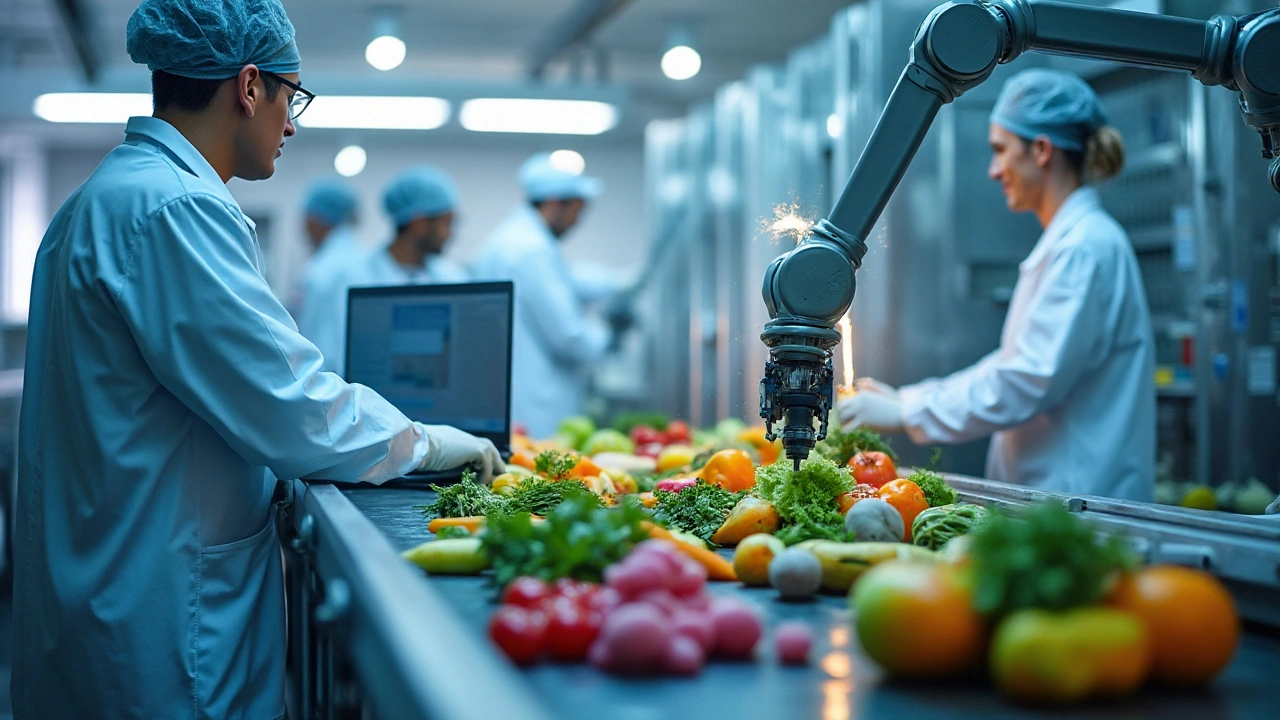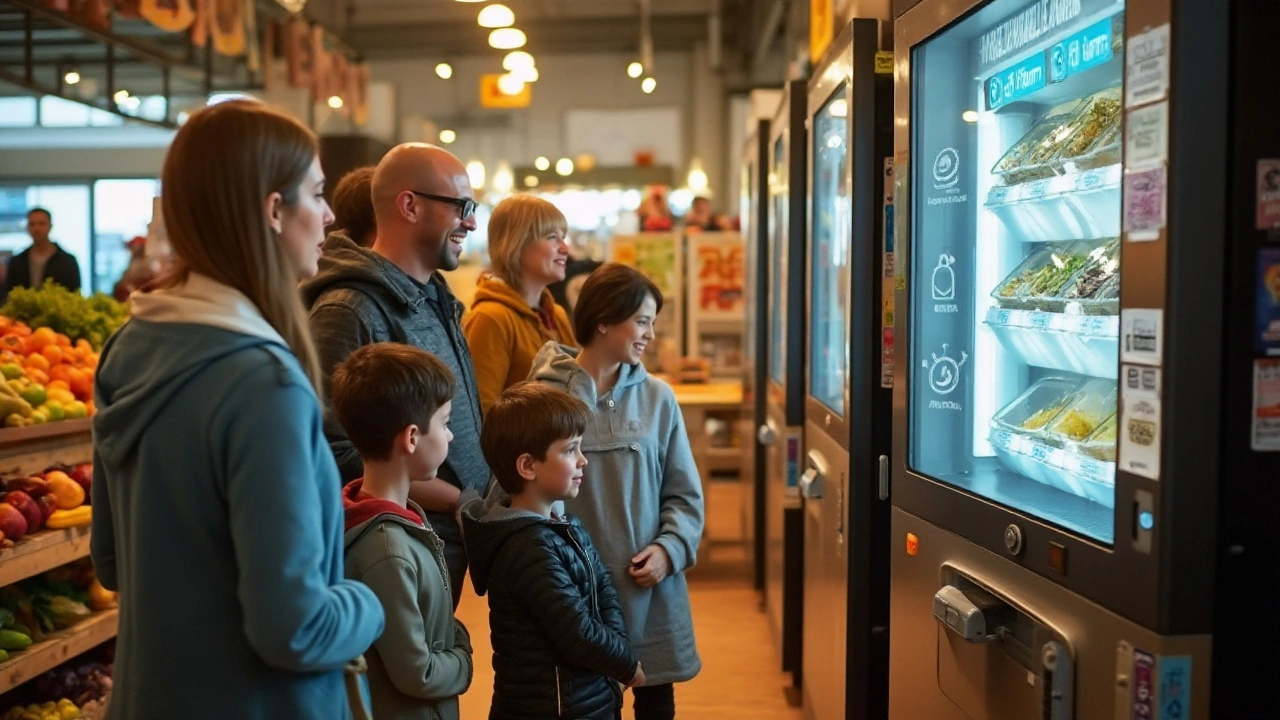The future of the food industry is being reshaped by the remarkable strides in artificial intelligence technology. This digital transformation is not only optimizing food production but also bringing revolutionary changes to how we ensure food quality and safety. Tech-savvy kitchens and smarter supply chains are just the tip of the iceberg.
Dive into this exploration to see how AI is making waves in a world where food meets technology. From intelligent cooking methods to personalized dietary plans, the possibilities are endless. We'll unravel the layers of artificial intelligence applications and see how they're crafting a promising future for food enthusiasts and industry leaders alike.
- Understanding AI in the Food Industry
- Innovative Applications in Food Production
- Enhancing Food Safety with AI
- Sustainable Food Supply Chains
- AI in Personalized Nutrition
- Future Prospects for AI in Food
Understanding AI in the Food Industry
Artificial Intelligence, with its remarkable ability to process information and make decisions, is gradually becoming an integral cog in the machination of the food industry. This digital marvel is doing wonders, not only in automating monotonous tasks but also in enhancing the overall efficiency and precision of food operations. In many modern facilities, AI systems are stalwarts in ensuring products of the highest quality by leveraging sophisticated pattern recognition and real-time data analysis. For instance, innovative sorting systems powered by AI are adept at identifying and eliminating imperfections in produce with exceptional accuracy, a task no human eye could achieve at such speed and scale.
The role of AI extends to the realm of culinary art, molding the future kitchens into technologically imbued spaces that are adept at learning and adapting. Picture this: a smart oven capable of adjusting its internal temperature based on the real-time moisture and texture readings of the dish being cooked. AI’s transformative touch is thus not restricted to industrial settings but is trickling down to our homes, gradually infusing into our daily culinary experiences. As technology continues to evolve, the full spectrum of AI’s capabilities remains a tantalizing prospect.
Fueling this change are tech companies, big and small, investing resources in pioneering AI solutions tailored specifically for the food sector. According to a recent study, investments in AI for food industry applications have grown exponentially, reflecting its increasing significance in the global market.
"Artificial Intelligence is not just a tool but a catalyst for innovation, enabling brands to deliver unprecedented quality and transparency to their consumers," a renowned food technologist remarks.
The potential of AI to profoundly impact personalized nutrition also deserves attention. With the explosion of health and wellness trends, AI systems are being harnessed to analyze individual dietary needs and recommend tailored meal plans. By incorporating AI, nutrition apps can now predict and suggest dietary changes based on users' health metrics and preferences, granting individuals more control over their health outcomes. It is no surprise that many forward-thinking companies are eyeing AI as the next frontier to exploit in their quest to redefine consumer experiences.
Innovative Applications in Food Production
The integration of artificial intelligence into food production is nothing short of revolutionary. From planting to harvesting, smart technologies are optimizing every stage of the food production cycle. One compelling example is the use of AI in precision agriculture, where machine learning algorithms analyze data from drones and IoT devices to determine the optimal time for sowing seeds or applying fertilizers. This approach not only improves crop yields but also makes sustainable farming practices possible.
Another groundbreaking application is in the area of quality control. Imagine computer vision systems that inspect fruits and vegetables, identifying imperfections more accurately than the human eye. These systems can work 24/7 without fatigue, significantly reducing food waste by ensuring that only the best produce reaches the shelves. There's also an exciting innovation in smart packaging, where sensors monitor freshness and communicate it to both retailers and consumers, allowing them to make informed decisions about inventory and consumption.
A global food corporation reported a 30% increase in processing efficiency after implementing AI-driven robotics into its packaging line.
"The efficiency and precision offered by AI have transformed our operations," says John Doe, head of technological innovation at the corporation. "We are now able to meet demand faster while maintaining high standards."These improvements indicate the tremendous potential AI has to streamline food production processes.
Moreover, AI plays a role in predicting trends and consumer preferences. By analyzing data from social media, purchasing patterns, and market trends, food producers can better understand what products are likely to succeed. They can then tailor their offerings to meet these demands, allowing for a more dynamic and responsive food production approach, creating products that align with real consumer needs. A survey showed that 60% of consumers felt that AI-driven food trends aligned more accurately with their lifestyle choices. As AI becomes more integrated, its role in refining food production will continue to expand, showcasing its vital position in shaping the future of food.

Enhancing Food Safety with AI
In the journey to make food safer for consumers, AI in the food industry emerges as a beacon of innovation and assurance. The prospect of ensuring food safety through technology isn't just a distant dream; it's becoming a reality that transforms how we monitor and maintain quality. AI systems capable of learning and improving over time are now effectively deployed in identifying potential hazards within the food supply chain, significantly reducing the risks of contamination.
One of the most prevalent challenges faced by the food industry is contamination, often leading to recalls that can jeopardize public health and cost millions of dollars. Now, AI algorithms are being utilized to detect contaminants that the human eye might miss. AI-powered machines are adept at scanning products for foreign particles, ensuring that only safe food reaches the consumer's table. This vigilant monitoring helps mitigate risks and maintains the integrity of food products. An insightful quote by Dr. Thomas Burke, a prominent researcher in food technology, puts it aptly:
"Artificial intelligence serves as the guardian angel in our kitchens, protecting us from the unseen and ensuring what we consume is genuinely safe.”
Another crucial application is predictive analytics, where AI anticipates potential safety issues even before they arise. By analyzing historical data and identifying patterns, AI systems can warn manufacturers of impending risks. This forecasting ability allows businesses to intervene proactively and avoid possible crises. One notable example is IBM's collaboration with major retailers, using AI to improve food traceability and reduce waste. By enhancing visibility across the supply chain, retailers can respond quickly to any safety concerns, thus maintaining consumer trust.
Pathogen detection technology is also witnessing breakthroughs thanks to AI integration. Traditional lab tests can take days to yield results, but AI accelerates the process, delivering speedy and accurate findings. Improved sensors embedded with AI capabilities identify microbial growth in real time, providing an unprecedented level of assurance. This swift detection facilitates timely action, preventing the spread of foodborne illnesses. The brilliance of AI extends to ensuring that food labels accurately reflect nutritional content, protecting those with dietary needs and allergies.
Implementation of blockchain coupled with AI further revolutionizes transparency in food safety. Blockchain provides an immutable record of a product's journey, from farm to fork. This combination ensures that every step taken is both traceable and accountable, leaving no room for errors. Consumers are empowered to make informed choices, fostering a culture of conscientious consumption. As AI tech knowledge advances, the potential to enhance food safety is vast, promising a future where food-related hazards are greatly minimized.
Sustainable Food Supply Chains
In our modern world, creating a sustainable food supply chain is not just an ambition, it's a necessity. The role of AI in the food industry is integral, offering innovative solutions to previously insurmountable challenges. From reducing food wastage to optimizing logistics, AI-powered systems are making supply chains more efficient and environmentally friendly. The use of AI allows companies to predict demand with unprecedented accuracy, minimizing excess production and storage, which leads to considerable reductions in waste.
Food spoilage is a notable concern, especially considering how much is lost due to imperfect handling. Intelligent sensors and IoT devices now play a vital role in monitoring the conditions during transportation and storage of food items. By analyzing data in real time, AI helps in making instant decisions that can prevent spoilage before it occurs. Meanwhile, predictive analytics, backed by machine learning algorithms, optimize routes and schedules, reducing unnecessary travel and lowering carbon footprints.
"The potential for AI in supply chain operations is vast, as it not only improves efficiency, but significantly aids in sustainability efforts," said Evelyn Rodriguez, a tech analyst at Future Food Solutions. "It's about marrying technology with environmental consciousness."
The agricultural sector, too, sees the fruits of AI. By employing smart farming techniques, such as autonomous tractors and harvesters equipped with AI, the process becomes less resource-intensive and more productive. AI systems assess environmental conditions, crop health, and market dynamics to fine-tune harvesting schedules, ensuring the right produce at the right time. This synergy results in less waste and improved resource management.
Sustainable practices in the supply chain also require transparency, where blockchain technology, in conjunction with AI, offers promising solutions. Secure and traceable data from farm to fork reassures consumers about the authenticity of their food, fostering trust in the industry’s supply chain. This traceability further aids suppliers and retailers in identifying weaknesses and making the necessary adjustments.
Moreover, innovations in packaging technology driven by AI insights are enhancing shelf life and reducing environmental impact. Packaging designs are now made with materials that respond to environmental conditions, preserving freshness while being eco-friendly. AI assists in identifying the best materials and conservation methods based on historical and current consumption data.
In a world driven by technology, incorporating AI for a sustainable food supply chain isn't just about facing up to operational challenges; it’s about securing the future. We’re seeing an undeniable shift towards systems that are not only efficient but also conscious of the ecological imprint they leave behind. It’s evident that AI is steering the food industry's future towards sustainability, ensuring our food systems remain robust for generations to come.

AI in Personalized Nutrition
In a world where each individual's dietary needs are as unique as their fingerprints, AI in Personalized Nutrition is proving to be a game-changer. With the increasing accessibility to genetic testing and health data, artificial intelligence is offering tailor-made nutrition plans that cater specifically to an individual’s genetic makeup, lifestyle, and personal health goals. Imagine a future where AI algorithms analyze thousands of dietary variables, past health records, and even your DNA to recommend a precise diet plan designed to improve health outcomes. By leveraging machine learning, nutritionists can offer precise recommendations, ensuring that each meal plan supports optimal health and prevents potential ailments.
The journey to personalized nutrition begins with data collection. Wearable technology and health monitoring devices play a crucial role, as they continuously gather real-time information about an individual’s physical activity, vital signs, and even emotional well-being. This data is then processed by AI algorithms to identify patterns and correlations that might not be visible to the human eye. One striking example is the use of AI in detecting nutrient deficiencies before symptoms become apparent, allowing preventive measures to be taken well in advance. A study published in the Journal of Nutritional Science revealed that AI-driven nutrition plans led to a significant improvement in adherence and satisfaction compared to traditional nutrition counseling.
Enhancing Dietary Recommendations
The power of AI extends to keeping nutrition advice relevant and adaptable. As humans, our dietary needs can change—sometimes drastically over time—depending on various life stages, from infancy to old age. AI can dynamically adjust recommendations as it receives new data inputs, almost replicating a personal dietitian available around the clock. Notable advancements have been made by platforms like Nutrino and EatLove, which use complex AI models to evaluate daily dietary choices, guide food selection, and even influence shopping habits by suggesting suitable grocery items based on dietary restrictions. AI analyzes massive databases of food nutrients and compares user consumption patterns against optimal intakes, always ensuring that the diet adheres to both health objectives and personal preferences.
"AI empowers us to see nutrition through a new lens, allowing unprecedented personalization and precision," says Dr. Jane Hunter, a leading researcher in nutritional sciences. "It's not merely about what you eat, but how the composition of your meals aligns with your unique genetic and lifestyle blueprint."
Data-Driven Sustainable Choices
Beyond health benefits, AI is also steering personalized nutrition towards sustainability. As the need for eco-friendly practices grows, artificial intelligence offers insights into how personal food choices impact the environment. Algorithms can suggest alternatives that not only meet dietary goals but also reduce carbon footprints by promoting plant-based choices and minimizing processed foods. Tech companies are integrating sustainability markers into their AI models, enabling individuals to make informed decisions that contribute to a healthier planet. The convergence of personal health and environmental well-being presents a holistic approach to nutrition, one that resonates with the values of health-conscious consumers today.
| Aspects | Traditional Diet | AI-Driven Personalized Diet |
|---|---|---|
| Data Collection | Manual input, generic plans | Wearable devices, precise data |
| Recommendations | Generalized | Tailored, real-time adjustments |
| Environmental Impact | Often overlooked | Incorporates sustainability |
Future Prospects for AI in Food
As we peer into the future of the food industry, the role of artificial intelligence appears boundless and brimming with potential. The integration of AI in food production, distribution, and consumption is expected to not only enhance efficiencies but also redefine entire processes. One of the fascinating prospects is the evolution of intelligent kitchen assistants. These smart devices are evolving rapidly, utilizing AI in food industry tasks, offering everything from cooking instructions adaptive to user skills to real-time dietary adjustments for health enthusiasts.
In the realm of food production, AI is refining quality control measures with precision akin to the human eye yet operating at a speed that far outstrips any manual approach. Automated defect detection ensures that only the finest produce makes its way to consumers' plates, enhancing food safety by reducing contamination risks. In this arena, AI is not only speeding up processes but is also significantly slashing waste, thereby supporting sustainable practices. As AI applications proliferate, mitigation of environmental impacts becomes a tangible reality. The adoption of AI technologies could contribute to a significant reduction in carbon footprints across the industry.
According to Emma Harris, a leading researcher in food technology, "AI has the capacity to transform our food systems by making them more resilient, efficient, and sustainable. The innovations we make today will lay the foundations for food security for future generations."
The future also holds promise for personalized nutrition plans powered by AI. With the increasing prevalence of health-conscious consumers, AI could offer tailor-made dietary solutions that align with individual health needs and preferences. By analyzing vast datasets of nutritional information and user health metrics, AI can devise meal plans optimized to maintain wellness and prevent disease. Applications that once seemed like science fiction are now on the cusp of becoming everyday tools in our kitchens.
Beyond individual health benefits, AI has a role to play in shaping global food policies and strategies. By providing data-driven insights, AI can assist policymakers in making informed decisions regarding agricultural practices, trade policies, and food distribution networks. This has the potential to alleviate food scarcity in regions struggling with food security, ensuring that more equitable food systems are achieved worldwide.
As we stand on the brink of this technological frontier, it's important to recognize the partnerships between technology developers and food producers that are essential to maximizing AI's potential. Collaboration is a cornerstone for developing innovative systems that are both feasible and beneficial. The dialogue between AI technology experts and agricultural leaders will pave the way for breakthroughs in food technology.
Ultimately, while the possibilities seem endless, the ethical implications of AI's growing presence in the food sector warrant consideration. Transparency, data privacy, and consumer trust are just a few issues that will need robust policies to guide ethical AI deployment. As AI continues to revolutionize the way we think about and engage with food, balancing technological advancement with ethical standards will be a defining aspect of the journey ahead.

